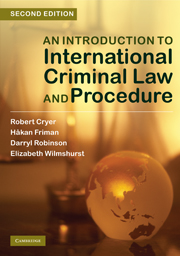Book contents
- Frontmatter
- Contents
- Preface to the Second Edition
- Table of Cases
- Table of Treaties and other International Instruments
- Table of Abbreviations
- PART A INTRODUCTION
- 1 Introduction: What is International Criminal Law?
- 2 The Objectives of International Criminal Law
- PART B PROSECUTIONS IN NATIONAL COURTS
- PART C INTERNATIONAL PROSECUTIONS
- PART D SUBSTANTIVE LAW OF INTERNATIONAL CRIMES
- PART E PRINCIPLES AND PROCEDURES OF INTERNATIONAL PROSECUTIONS
- PART F RELATIONSHIP BETWEEN NATIONAL AND INTERNATIONAL SYSTEMS
- Index
- References
2 - The Objectives of International Criminal Law
from PART A - INTRODUCTION
Published online by Cambridge University Press: 05 June 2012
- Frontmatter
- Contents
- Preface to the Second Edition
- Table of Cases
- Table of Treaties and other International Instruments
- Table of Abbreviations
- PART A INTRODUCTION
- 1 Introduction: What is International Criminal Law?
- 2 The Objectives of International Criminal Law
- PART B PROSECUTIONS IN NATIONAL COURTS
- PART C INTERNATIONAL PROSECUTIONS
- PART D SUBSTANTIVE LAW OF INTERNATIONAL CRIMES
- PART E PRINCIPLES AND PROCEDURES OF INTERNATIONAL PROSECUTIONS
- PART F RELATIONSHIP BETWEEN NATIONAL AND INTERNATIONAL SYSTEMS
- Index
- References
Summary
Introduction
The assertion of criminal jurisdiction over a person is amongst the most coercive activities any society can undertake. Punishing a person involves conduct towards them which requires a deprivation of some form of their liberty or a setting-back of their property interests. Such a deprivation of liberty or property requires justification. Furthermore, criminal law is not, in itself, a good or a bad thing. It is a tool, designed to achieve certain ends. Some of those ends may be better pursued by means other than prosecutions.
It has been suggested by some that the justifications for punishment may differ, or at least be differently interpreted, between international criminal law and domestic criminal law. It is true that the general situations in which international criminal law is invoked are those of mass criminality, which are not the normal case in domestic criminal law enforcement. In addition, certain additional aims for international criminal law tend to be grafted onto those which are postulated for domestic systems of criminal law. These include the telling of the history of a conflict, distinguishing individual from group responsibility, reconciling societies and capacity building in domestic judicial systems.
It is also true that international society is not the same as domestic society. Nonetheless, much of the implementation of international criminal law is intended to be at the domestic level, therefore it is questionable whether the objectives of punishment ought to differ that significantly between international and municipal criminal law.
- Type
- Chapter
- Information
- Publisher: Cambridge University PressPrint publication year: 2010
References
- 2
- Cited by



